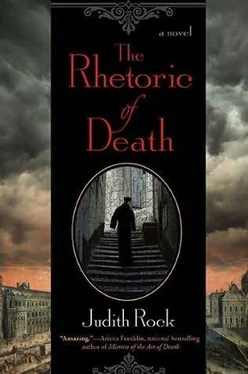Judith Rock - The Rhetoric of Death
Здесь есть возможность читать онлайн «Judith Rock - The Rhetoric of Death» весь текст электронной книги совершенно бесплатно (целиком полную версию без сокращений). В некоторых случаях можно слушать аудио, скачать через торрент в формате fb2 и присутствует краткое содержание. Жанр: Исторический детектив, на английском языке. Описание произведения, (предисловие) а так же отзывы посетителей доступны на портале библиотеки ЛибКат.
- Название:The Rhetoric of Death
- Автор:
- Жанр:
- Год:неизвестен
- ISBN:нет данных
- Рейтинг книги:3 / 5. Голосов: 1
-
Избранное:Добавить в избранное
- Отзывы:
-
Ваша оценка:
- 60
- 1
- 2
- 3
- 4
- 5
The Rhetoric of Death: краткое содержание, описание и аннотация
Предлагаем к чтению аннотацию, описание, краткое содержание или предисловие (зависит от того, что написал сам автор книги «The Rhetoric of Death»). Если вы не нашли необходимую информацию о книге — напишите в комментариях, мы постараемся отыскать её.
The Rhetoric of Death — читать онлайн бесплатно полную книгу (весь текст) целиком
Ниже представлен текст книги, разбитый по страницам. Система сохранения места последней прочитанной страницы, позволяет с удобством читать онлайн бесплатно книгу «The Rhetoric of Death», без необходимости каждый раз заново искать на чём Вы остановились. Поставьте закладку, и сможете в любой момент перейти на страницу, на которой закончили чтение.
Интервал:
Закладка:
Charles dug his formal three-pronged Jesuit hat from the saddlebag, stowed his outdoor hat, and crossed the forecourt under the assessing stare of the Jesuit waiting at the top of a flight of handsome stone steps, beside the house door. The doorkeeper asked his name and led him into a long salon glowing with candlelight, whose wide casements stood open to the evening, letting moths blunder in to singe themselves in the candle flames. The salon’s plain white plaster walls and bare wood floor contrasted sharply with the men who filled it. The curls of their full-bottomed wigs clustered on their blue, green, gold, and tawny shoulders. Snowy lace and lawn rippled down the fronts of their full-skirted coats and foamed from their foot-wide cuffs. Rings twinkled and ribbons fluttered on high-heeled shoes as they gestured and bowed to one another, and their busy eyes missed nothing.
Charles followed his guide through the crowd, past the richly dressed men and the Jesuits quietly offering them wine in plain, cone-shaped glasses like those that graced the college tables. The plangent sound of recorder and lute wove through the buzzing talk, and Charles finally found the musicians reflected in a gilt-framed mirror. It was the room’s only decoration besides a half-life-size and brightly painted crucifix on the wall toward which his guide was leading him. As they passed the mirror, it also showed Charles three Capuchin monks, their signature pointed brown hoods hanging down their backs. A Capuchin had been Cardinal Richelieu’s spymaster in the previous reign and Charles wondered if the order offered similar services to Pere La Chaise, the king’s confessor. To his discomfort, he realized that he was only half joking. His guide stopped in front of a sixtyish, fleshy-faced Jesuit standing before the crucifix.
“Pere La Chaise,” the doorkeeper said, bowing, “may I present Maitre Charles du Luc, from the College of Louis le Grand?” He gestured Charles forward and retreated.
“Bon soir, mon pere,” Charles murmured, bowing low.
La Chaise inclined his head and turned to the tall, fair-haired man in a russet coat and breeches who stood beside him. “If you would excuse us for a moment, mon ami? College business. Often banal, I fear, but it must be done.”
A shadow of annoyance passed over the fair-haired man’s big-boned face, but he nodded politely. Surprised at not being introduced, Charles watched him withdraw toward the windows.
“Mon pere,” he said, remembering his manners and taking the rector’s two letters from his inside pocket, “I bring you these from Pere Le Picart.”
La Chaise looked briefly at the letter about the Siamese, pocketed it, and unfolded the second. As he read, Charles studied him. The king’s confessor had fine dark hair that curled a little around his skullcap, a high forehead, a long straight nose, and a doubling chin. The lines around his mouth were good humored and the look in his eyes was at once wise, weary, and tolerant. Charles supposed that after eleven years confessing King Louis XIV, a man would have to either look like that or be a crabbed, bitter cynic. La Chaise refolded the letter introducing Charles and looked up, smiling.
“You are most welcome, Maitre du Luc. To Louis le Grand and to this house.” He lowered his voice and spoke just on the edge of hearing. “If I can help you, you have only to ask. We must make sure that these sad events at the college damage us as little as may be.”
“And we must make sure that the guilty are found, mon pere.”
“That goes without saying. What do you need here this evening?”
“I was told to meet whoever is representing the Prince of Conde’s household, mon pere.”
“Ah. Unfortunately, I have been told that the Hotel de Conde’s chaplain, who usually comes, has sent his regrets. I trust you will still be able to make good use of your presence, maitre.”
“I trust so, mon pere,” Charles said, thinking that now he was free to concentrate on Guise.
La Chaise reached under his cassock, drew something out, and peered at it. He opened his hand and showed Charles a tiny clock in the shape of a skull. “My timekeeper. Spiritually as well as temporally useful, as you see. I must seek someone else now, if you will excuse me. Come to me for whatever you need.”
Charles bowed his thanks and waited courteously for La Chaise to walk away first. Then he went to find the circulating drinks. Sipping the disappointing but thoroughly Jesuit vintage, he scanned the room for Guise and listened to the conversation around him. A few feet away, a bantam-sized young man in lushly purple velvet was holding forth on the philosopher Spinoza.
“-and I assure you, gentlemen,” he was saying, “I have the very best authority for my opinion: my illustrious confessor, the devout and learned Pere Guise.”
Charles moved closer, gratified to see that the name made some of the listeners look as though they’d swallowed vinegar. This looked like his cue to start talking the horns off a brass goat. He surveyed his goat a moment longer, assumed an expression of polite interest, and joined the little circle.
“I say it again, this Jew’s god has no divine plan,” the goat pronounced, as the circle made room for Charles. “The god of Spinoza feels nothing, judges nothing, he is as cold and useless to the soul as a triangle.” The young man looked around the circle, preening himself.
“Earnestly argued, monsieur,” Charles said, with a smile and a bow. “But-cold as a triangle? I find your argument flawed.”
“Indeed, mon pere?” The goat blinked. “I am surprised to hear a Jesuit say so.”
“Please, I am a mere maitre, monsieur. Not pere, not yet. Maitre Charles du Luc, newly at Louis le Grand. As for your surprise, this Spinoza sometimes echoes Jesuit teaching.”
An older man eyed Charles with respect and nodded, but the rest looked puzzled.
“Allow me to quote from our gentle Jew’s Ethics.” Charles assumed ballet’s fourth position, the rhetorician’s stance. “ ‘ There cannot be too much merriment.’ And ‘Nothing save gloomy superstition prohibits laughter.’ And again, ‘To make use of things, and take delight in them… is the part of a wise man.’ The Society of Jesus teaches that we must make learning pleasurable. And that whatever is good and innocent of itself is worthy of Christian attention and delight and can be used to the glory of God.”
The young man swelled with offense. Teetering on his very high heels, he tried to make himself seem taller as he faced Charles. “How can you possibly compare infidel maunderings with pious Catholic teaching?”
“Oh, dear. Do you mean that we are to reject all Jewish writing?” Charles frowned and looked around the circle as though for help. “But, monsieur, the Jews gave us the Old Testament, which speaks of a Savior.” He threw out his hands in supplication. “And, think, I beg you-if we got rid of the Old Testament, Holy Scripture would lose fully three-quarters of its volume. Would that be wise? If Holy Writ weighed so little, ordinary people might want to carry it around. Even read it and interpret it for themselves! Like the Huguenots,” Charles said in a shocked whisper. “And then where would good Catholics be?” Besides better educated and less credulous, he added silently, as several of his listeners snorted with laughter.
“I am not speaking of Holy Scripture,” the young man said stiffly. “Spinoza was a Christ killer trying to lead good Christians astray. I trust you do not allow his work at Louis le Grand.”
“Oh no,” Charles said in a horrified tone. “Pere Guise would never stand for that.”
“Certainly not! A more ardent and orthodox Christian does not exist.”
Charles looked vaguely around. “Where is Pere Guise? I have not yet seen him.”
Читать дальшеИнтервал:
Закладка:
Похожие книги на «The Rhetoric of Death»
Представляем Вашему вниманию похожие книги на «The Rhetoric of Death» списком для выбора. Мы отобрали схожую по названию и смыслу литературу в надежде предоставить читателям больше вариантов отыскать новые, интересные, ещё непрочитанные произведения.
Обсуждение, отзывы о книге «The Rhetoric of Death» и просто собственные мнения читателей. Оставьте ваши комментарии, напишите, что Вы думаете о произведении, его смысле или главных героях. Укажите что конкретно понравилось, а что нет, и почему Вы так считаете.












